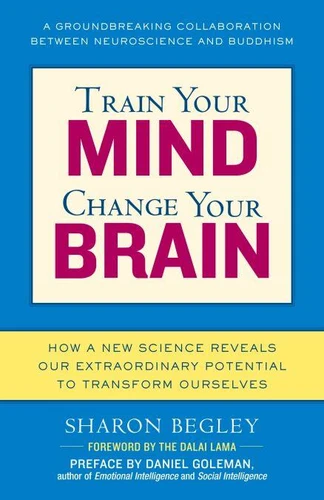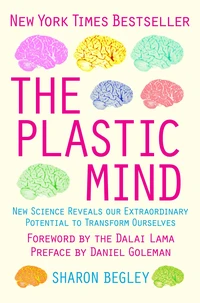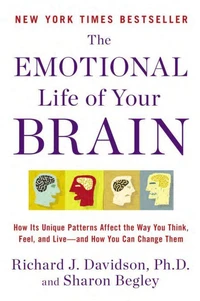Train Your Mind, Change Your Brain. How a New Science Reveals Our Extraordinary Potential to Transform Ourselves
Par :Formats :
Disponible dans votre compte client Decitre ou Furet du Nord dès validation de votre commande. Le format ePub protégé est :
- Compatible avec une lecture sur My Vivlio (smartphone, tablette, ordinateur)
- Compatible avec une lecture sur liseuses Vivlio
- Pour les liseuses autres que Vivlio, vous devez utiliser le logiciel Adobe Digital Edition. Non compatible avec la lecture sur les liseuses Kindle, Remarkable et Sony
- Non compatible avec un achat hors France métropolitaine
 , qui est-ce ?
, qui est-ce ?Notre partenaire de plateforme de lecture numérique où vous retrouverez l'ensemble de vos ebooks gratuitement
Pour en savoir plus sur nos ebooks, consultez notre aide en ligne ici
- Nombre de pages304
- FormatePub
- ISBN978-0-307-49208-1
- EAN9780307492081
- Date de parution12/11/2008
- Protection num.Adobe DRM
- Taille2 Mo
- Infos supplémentairesepub
- ÉditeurBallantine Books
Résumé
Cutting-edge science and the ancient wisdom of Buddhism have come together to reveal that, contrary to popular belief, we have the power to literally change our brains by changing our minds. Recent pioneering experiments in neuroplasticity-the ability of the brain to change in response to experience-reveal that the brain is capable of altering its structure and function, and even of generating new neurons, a power we retain well into old age.
The brain can adapt, heal, renew itself after trauma, compensate for disabilities, rewire itself to overcome dyslexia, and break cycles of depression and OCD. And as scientists are learning from studies performed on Buddhist monks, it is not only the outside world that can change the brain, so can the mind and, in particular, focused attention through the classic Buddhist practice of mindfulness. With her gift for making science accessible, meaningful, and compelling, science writer Sharon Begley illuminates a profound shift in our understanding of how the brain and the mind interact and takes us to the leading edge of a revolution in what it means to be human.
Praise for Train Your Mind, Change Your Brain "There are two great things about this book. One is that it shows us how nothing about our brains is set in stone. The other is that it is written by Sharon Begley, one of the best science writers around. Begley is superb at framing the latest facts within the larger context of the field. This is a terrific book."-Robert M. Sapolsky, author of Why Zebras Don't Get Ulcers "Excellent .
The brain can adapt, heal, renew itself after trauma, compensate for disabilities, rewire itself to overcome dyslexia, and break cycles of depression and OCD. And as scientists are learning from studies performed on Buddhist monks, it is not only the outside world that can change the brain, so can the mind and, in particular, focused attention through the classic Buddhist practice of mindfulness. With her gift for making science accessible, meaningful, and compelling, science writer Sharon Begley illuminates a profound shift in our understanding of how the brain and the mind interact and takes us to the leading edge of a revolution in what it means to be human.
Praise for Train Your Mind, Change Your Brain "There are two great things about this book. One is that it shows us how nothing about our brains is set in stone. The other is that it is written by Sharon Begley, one of the best science writers around. Begley is superb at framing the latest facts within the larger context of the field. This is a terrific book."-Robert M. Sapolsky, author of Why Zebras Don't Get Ulcers "Excellent .
Cutting-edge science and the ancient wisdom of Buddhism have come together to reveal that, contrary to popular belief, we have the power to literally change our brains by changing our minds. Recent pioneering experiments in neuroplasticity-the ability of the brain to change in response to experience-reveal that the brain is capable of altering its structure and function, and even of generating new neurons, a power we retain well into old age.
The brain can adapt, heal, renew itself after trauma, compensate for disabilities, rewire itself to overcome dyslexia, and break cycles of depression and OCD. And as scientists are learning from studies performed on Buddhist monks, it is not only the outside world that can change the brain, so can the mind and, in particular, focused attention through the classic Buddhist practice of mindfulness. With her gift for making science accessible, meaningful, and compelling, science writer Sharon Begley illuminates a profound shift in our understanding of how the brain and the mind interact and takes us to the leading edge of a revolution in what it means to be human.
Praise for Train Your Mind, Change Your Brain "There are two great things about this book. One is that it shows us how nothing about our brains is set in stone. The other is that it is written by Sharon Begley, one of the best science writers around. Begley is superb at framing the latest facts within the larger context of the field. This is a terrific book."-Robert M. Sapolsky, author of Why Zebras Don't Get Ulcers "Excellent .
The brain can adapt, heal, renew itself after trauma, compensate for disabilities, rewire itself to overcome dyslexia, and break cycles of depression and OCD. And as scientists are learning from studies performed on Buddhist monks, it is not only the outside world that can change the brain, so can the mind and, in particular, focused attention through the classic Buddhist practice of mindfulness. With her gift for making science accessible, meaningful, and compelling, science writer Sharon Begley illuminates a profound shift in our understanding of how the brain and the mind interact and takes us to the leading edge of a revolution in what it means to be human.
Praise for Train Your Mind, Change Your Brain "There are two great things about this book. One is that it shows us how nothing about our brains is set in stone. The other is that it is written by Sharon Begley, one of the best science writers around. Begley is superb at framing the latest facts within the larger context of the field. This is a terrific book."-Robert M. Sapolsky, author of Why Zebras Don't Get Ulcers "Excellent .







